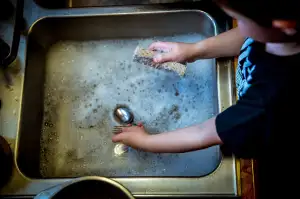Banish Fruit Flies for Good: Expert Tips to Eliminate Pesky Pests from Your Home

Fruit flies, scientifically known as Drosophila melanogaster, are small insects that can become a major annoyance in our homes. These tiny pests are attracted to ripe or decaying fruits and vegetables, making our kitchens their ideal breeding ground. Fruit flies reproduce rapidly, with females laying up to 500 eggs at a time. Their short life cycle of just 8-10 days allows them to multiply quickly, causing frustration for homeowners.
The presence of fruit flies not only disrupts our daily routines but also poses health risks. These insects carry bacteria on their bodies and can contaminate our food, leading to potential illness if consumed. Additionally, their constant buzzing and swarming around food can be highly irritating.
To maintain a clean and hygienic kitchen environment, it is crucial to understand the source of fruit flies and take necessary steps to eliminate them effectively. By following expert tips and implementing preventive measures, we can banish these pesky pests from our homes once and for all.
Identifying the source of fruit flies
Identifying the source of fruit flies is crucial in eliminating these pesky pests from your home. Fruit flies are attracted to ripe or decaying fruits and vegetables, as well as fermented liquids and moist areas. Check for any overripe produce in your kitchen, especially bananas, apples, and tomatoes, which are their favorites. Also, inspect your garbage cans, drains, and compost bins for any food residue or standing water that may be attracting fruit flies. By pinpointing the source, you can effectively target your efforts to eradicate them from your home.
Proper storage and disposal of fruits and vegetables
Proper storage and disposal of fruits and vegetables is crucial in preventing fruit fly infestations. To keep these pesky pests at bay, it is important to follow a few key guidelines. Firstly, always store ripe or overripe fruits in the refrigerator. This will slow down the ripening process and make them less attractive to fruit flies. Additionally, ensure that all fruits and vegetables are stored in sealed containers or bags to prevent fruit flies from accessing them. When disposing of spoiled or rotting produce, be sure to do so outside of your home in a sealed garbage bin. This will prevent fruit flies from being attracted to the decaying matter and entering your living space. By implementing these simple storage and disposal practices, you can significantly reduce the risk of fruit fly infestations in your home.
Cleaning and maintaining a fruit fly-free kitchen
To maintain a fruit fly-free kitchen, regular cleaning is essential. Start by wiping down countertops, sinks, and other surfaces with a mixture of vinegar and water. Fruit flies are attracted to the sweet smells left behind by spills and sticky residue, so be sure to clean up any spills immediately.
Next, empty and clean your garbage cans frequently. Fruit flies can breed in decaying organic matter, so it's crucial to dispose of any food waste promptly. Make sure to seal your trash bags tightly and take them out regularly.
Pay attention to your drains as well. Fruit flies can lay their eggs in the moist environment of drains. To prevent this, flush your drains with boiling water or use a drain cleaner regularly.
Lastly, keep your kitchen tidy by storing food in airtight containers. This will prevent fruit flies from accessing ripe fruits and vegetables. Additionally, make sure to wash all produce thoroughly before storing or consuming it.
By following these cleaning practices, you can create an environment that is not conducive to fruit fly breeding and eliminate their presence in your kitchen.
DIY traps and remedies to eliminate fruit flies
DIY traps and remedies are effective in eliminating fruit flies from your home. One popular method is the vinegar trap. Fill a small container with apple cider vinegar and add a few drops of dish soap. Cover it with plastic wrap, securing it with a rubber band, and poke small holes in the wrap. The scent of the vinegar will attract the fruit flies, and they will get trapped in the liquid due to the dish soap breaking the surface tension. Another remedy is using a ripe banana as bait. Place a piece of overripe banana in a jar and cover it tightly with plastic wrap, poking small holes in it. The sweet aroma will lure the fruit flies into the jar, but they won't be able to escape. Remember to regularly empty these traps to prevent re-infestation.
Natural repellents and deterrents for fruit flies
Natural repellents and deterrents for fruit flies are a safe and effective way to keep these pesky pests at bay. One popular option is using essential oils, such as lemongrass, peppermint, or lavender. Simply mix a few drops of your chosen oil with water in a spray bottle and spritz it around areas where fruit flies tend to gather.
Another natural repellent is apple cider vinegar. Fruit flies are attracted to the sweet smell of vinegar, so fill a small bowl with apple cider vinegar and add a few drops of dish soap. The dish soap will break the surface tension of the vinegar, causing the fruit flies to drown when they land on it.
If you prefer a non-toxic option, try making a homemade fruit fly trap using a jar or container filled with ripe or overripe fruits. Cover the container with plastic wrap and poke several small holes in it. The fruit flies will be lured by the scent of the fruits but won't be able to escape once they enter through the holes.
Lastly, consider using herbs like basil or mint as natural deterrents. Planting these herbs near your kitchen windows or keeping small pots indoors can help repel fruit flies due to their strong aroma.
By incorporating these natural repellents and deterrents into your home, you can effectively keep fruit flies away without resorting to harsh chemicals or pesticides.
Preventive measures to avoid future fruit fly infestations
Preventive measures are key to keeping fruit flies at bay and ensuring a pest-free home. Here are some effective strategies to avoid future infestations:
1. Regularly inspect and discard overripe or rotting fruits and vegetables. Fruit flies are attracted to the fermenting sugars in decaying produce.
2. Store fruits and vegetables in sealed containers or in the refrigerator. This prevents fruit flies from accessing their food source.
3. Keep your kitchen clean by wiping down countertops, cleaning spills promptly, and regularly emptying trash cans.
4. Clean drains regularly using a mixture of vinegar and hot water to eliminate any organic matter that may attract fruit flies.
5. Avoid leaving dirty dishes in the sink for extended periods as they can provide breeding grounds for fruit flies.
6. Use mesh screens on windows and doors to prevent fruit flies from entering your home.
7. Be cautious when bringing in new fruits or vegetables from the grocery store, as they may already be infested with fruit fly eggs or larvae.
By implementing these preventive measures, you can significantly reduce the chances of future fruit fly infestations and enjoy a pest-free environment in your home.
By following these expert tips, you can banish fruit flies from your home and enjoy a pest-free kitchen. Remember to identify the source of fruit flies and properly store and dispose of fruits and vegetables. Regularly clean your kitchen, paying attention to areas where fruit flies might breed. DIY traps and remedies can be effective in eliminating fruit flies, while natural repellents like vinegar or essential oils can help deter them. Lastly, adopting preventive measures such as sealing cracks and maintaining cleanliness will help avoid future infestations. With these strategies in place, you can say goodbye to pesky fruit flies for good!
Published: 27. 02. 2024
Category: Home



